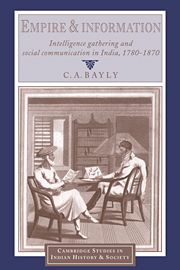Book contents
- Frontmatter
- Contents
- List of maps
- Preface
- Glossary
- List of abbreviations
- Introduction
- 1 Prologue: surveillance and communication in early modern India
- 2 Political intelligence and indigenous informants during the conquest of India, c. 1785–1815
- 3 Misinformation and failure on the fringes of empire
- 4 Between human intelligence and colonial knowledge
- 5 The Indian ecumene: an indigenous public sphere
- 6 Useful knowledge and godly society, c. 1830–50
- 7 Colonial controversies: astronomers and physicians
- 8 Colonial controversies: language and land
- 9 The information order, the Rebellion of 1857–9 and pacification
- 10 Epilogue: information, surveillance and the public arena after the Rebellion
- Conclusion: ‘Knowing the country’
- Bibliography
- Index
5 - The Indian ecumene: an indigenous public sphere
Published online by Cambridge University Press: 28 October 2009
- Frontmatter
- Contents
- List of maps
- Preface
- Glossary
- List of abbreviations
- Introduction
- 1 Prologue: surveillance and communication in early modern India
- 2 Political intelligence and indigenous informants during the conquest of India, c. 1785–1815
- 3 Misinformation and failure on the fringes of empire
- 4 Between human intelligence and colonial knowledge
- 5 The Indian ecumene: an indigenous public sphere
- 6 Useful knowledge and godly society, c. 1830–50
- 7 Colonial controversies: astronomers and physicians
- 8 Colonial controversies: language and land
- 9 The information order, the Rebellion of 1857–9 and pacification
- 10 Epilogue: information, surveillance and the public arena after the Rebellion
- Conclusion: ‘Knowing the country’
- Bibliography
- Index
Summary
So far this study has centred on the relationship between British intelligence establishments and indigenous informants, clerks and runners. By contrast, the following chapter is mainly concerned with communication and debate within the Indian population. India was a literacy-aware society if not yet a society of mass literacy. The elites and populace both used written media in complex and creative ways to reinforce oral culture and debate. Here we try to describe the institutions, tone and scope of the controversies about politics, religion and aesthetics which existed across north India in the eighteenth and early nineteenth centuries. Colonial ideologues and leaders of Indian opinion sought to draw on this tradition of communication and argument when ‘public instruction’ and ‘useful knowledge’ became slogans after 1830. These Indian debates were much more than religious polemic; they were both popular and political. The issues in contention related to religion, but in its public manifestation. They also concerned the interpretations of history and the obligations of indigenous and colonial rulers. Many of the diplomats and munshis we have encountered in Company service played a part in them. Rather than being collaborators with colonial rule, they regarded themselves as mediators between the people and the government, cajoling both towards correct conduct. These discourses on rights and duties informed a sphere of patriotic, public activity, which long predated the consciously nationalist public of the years after 1860, and was to determine its character to a considerable extent. The Indian nationalism of the later nineteenth century needs a longer perspective. We need to soften the sharp break between tradition and nationalist modernity, and between East and West, which still impoverishes the historical literature.
- Type
- Chapter
- Information
- Empire and InformationIntelligence Gathering and Social Communication in India, 1780–1870, pp. 180 - 211Publisher: Cambridge University PressPrint publication year: 1997
- 2
- Cited by



